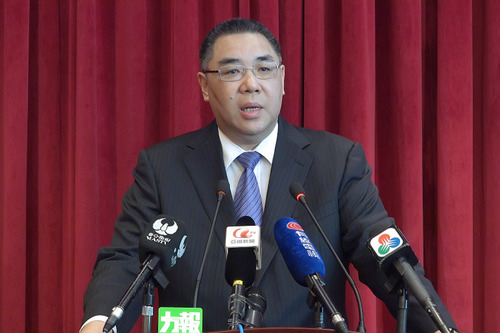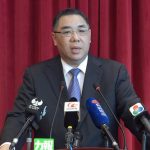 Chief Executive, Mr Chui Sai On, speaks to reporters before leaving for Beijing.
Chief Executive, Mr Chui Sai On, speaks to reporters before leaving for Beijing.
The Chief Executive, Mr Chui Sai On, today said the Government respected and complied with the principles of the rule of law and the independent power of the judiciary, as stipulated in the Basic Law. The Government upheld the same principles when handling an ongoing criminal case of corruption under investigation by the Commission Against Corruption involving staff at the Public Prosecutions Office, he added. Mr Chui’s comments were made this morning before he left for Beijing to attend the opening of the 4th Session of the 12th National People's Congress. The case had been reported to the Central Government, Mr Chui told reporters. The Government strictly adheres to – and the Central Government supports – the principle of the case proceeding according to the law. The case was not scheduled as a topic for discussion when he meets officials in Beijing, Mr Chui added. Mr Chui urged the community to understand the issue from the perspective of two principles: first, a respect for the independent power of the judiciary and a need for confidentiality in dealing with accused persons; second, everyone was entitled to the presumption of innocence until they were proven guilty. Mr Chui said it nonetheless saddened him if a public servant was investigated in a case regarding a suspicion of criminal conduct. The Chief Executive stated he had been informed about the case approximately one year ago by the Commission Against Corruption. The Commission operates independently, free from any interference, as a matter of principle, he added. Mr Chui also commented on reporters’ questions relating to technical legal issues that the case raises for Macao’s judicial system. The system had undergone nearly 16 years of development since 1999 based on the principle of independence, and was capable of further development, he said. Abiding by the law and respecting the independent operation of the judiciary are core values of the Macao Special Administrative Region, he stressed. In addition, Mr Chui said the Government would work toward improving transparency when handling issues relating to a private property project on Estrada do Campo in Coloane, he said. This might include the disclosure of more information about the project’s environmental evaluation as submitted to the Government. Regarding whether the Chief Executive might exercise his post’s discretionary power in relation to the property project, Mr Chui said he would closely study the matter with the Secretary for Transport and Public Works and with legal advisors. Macao’s legal system for planning matters had been enhanced by three pieces of legislation: the implementation of the Land Law; the Urban Planning Law; and the Heritage Protection Law. This enhanced system would in many cases minimise the need for the exercise of the Chief Executive’s discretionary power, Mr Chui said.


